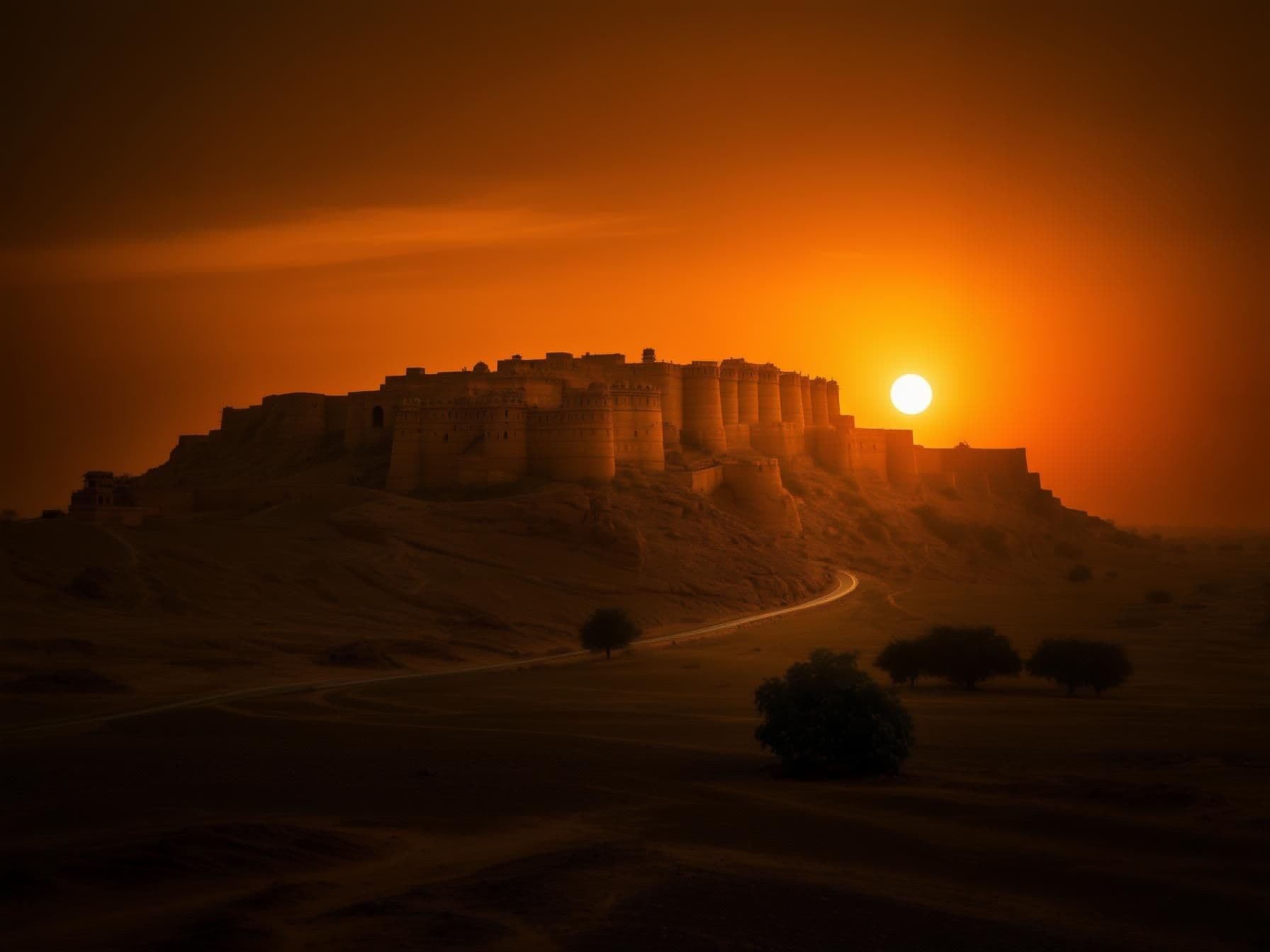
Jaisalmer Travel Guide: Best Time to Visit, Weather, and Festivals
Jaisalmer Travel Guide: Best Time to Visit, Weather, and Festivals
Complete guide to visiting Jaisalmer, India's golden desert city, covering perfect weather seasons, vibrant festivals, authentic experiences, desert safaris, and heritage hotels to find your ideal time to go.
Understanding Jaisalmer’s Climate with AI Travel Support
Seasonal Breakdown
Jaisalmer's climate is typically arid, firmly set in a desert zone. Despite its dry reputation, the city experiences three distinct seasons: summer, monsoon, and winter. The summer season lasts from March through June, bringing relentless heat that can challenge even the most seasoned travelers. The monsoon season, from July to September, provides a brief respite with sporadic rain showers, although it is not known for heavy downpours. Lastly, winter stretches from October to February, offering the city cool, crisp air and clear skies, presenting Jaisalmer at its most hospitable.
Temperature and Weather Conditions
During the scorching summer months, daytime temperatures often soar beyond 45°C (113°F), making sightseeing a challenge without proper precautions. Nighttime provides some relief, but the desert retains its warmth into the evening. In contrast, winter days are comfortably mild, with averages from 15°C to 25°C (59°F to 77°F), although desert nights during these months can drop sharply, occasionally nearing freezing. The monsoon season sees moderate rainfall, often transforming dusty plains into greener landscapes, though humidity may become uncomfortable. This significant temperature difference between day and night underscores the desert's climate nature, emphasizing the importance of packing appropriately and planning activities using a trip planner app.
Best Time to Visit Jaisalmer, India
Ideal Months for Travel
For most travelers using AI travel tools, the period between October and March is considered the ideal window to visit Jaisalmer. These months coincide with the cool and comfortable winter season, perfect for exploring the city’s architectural marvels, navigating bustling bazaars, and embarking on desert safaris. The pleasant weather allows visitors to enjoy evening camel rides beneath starry skies without the exhaustion accompanying summer heat. The searing summer months require caution, as temperatures can be unbearable, making many attractions less enjoyable. Similarly, the monsoon’s sporadic rains, though rare, can stir up dust and postpone outdoor plans. Thus, timing your trip to the desert during cooler months enhances the sightseeing experience.
Pros and Cons of Visiting in Different Seasons with AI Travel Insights
Winter is the peak tourist season in Jaisalmer, attracting travelers from all over the world eager to experience comfortable days and chilly nights. Clear skies offer excellent opportunities for stargazing and photography, and the city buzzes with cultural events, adding vibrancy to a visit. However, this popularity means accommodations can fill up quickly, making early bookings through your AI travel agent essential.
While less hospitable, temperature-wise, summer has its unique charm. The city is less crowded, offering solitude amidst popular sites. However, travelers must be prepared to endure intense heat and adjust their itineraries to early mornings or late evenings. Staying well-hydrated and seeking shade become crucial concerns.
During the monsoon, travelers find the desert quieter, with some local flora momentarily blooming. Despite rain rarity, occasional showers and dust can hinder outdoor activities like desert treks. However, for those preferring peaceful exploration free from crowds, this season offers its appeal.
Popular Festivals in Jaisalmer
Desert Festival (January or February)
One of Jaisalmer’s cultural calendar highlights is the Desert Festival, usually held in January or February. This vibrant event celebrates Rajasthan’s rich traditions through folk music, mesmerizing dances, and thrilling camel races. The city bursts into life, with locals and visitors wearing traditional attire and participating in colorful parades. The festival offers travelers an extraordinary chance to witness age-old customs and captivating performances set against the dramatic desert backdrop.
Ramdevra Fair (August)
The Ramdevra Fair stands out for its religious significance, honoring Baba Ramdevji, a folk deity revered across Rajasthan. Held in August, this fair attracts thousands of pilgrims. Besides spiritual fervor, it includes folk music, dance, and artisan stalls. Visitors gain a deep appreciation of local beliefs and traditions, adding a meaningful layer to a desert trip.
Diwali and Other Local Celebrations
Jaisalmer’s Diwali celebration, a major Indian festival of lights, showcases the city’s unique fusion of tradition and desert aesthetics. As lanterns illuminate narrow lanes and homes sparkle with diyas, the Golden City glows with an almost magical aura. Other local festivities, including Holi and Teej, are equally enchanting. Travelers visiting during these festivals should brace for large crowds but will be rewarded with unforgettable cultural experiences.
Travel Tips for a Trip to Jaisalmer, India
Packing Essentials with AI Travel Guidance
Packing for Jaisalmer balances desert practicality with comfort. For daytime, lightweight cotton clothing is crucial to beat the heat and allow the skin to breathe. Visitors should also prepare for cool nights by bringing warm layers like jackets or shawls. Sun protection, such as broad-brimmed hats, high-quality sunglasses, and sunscreen, is a must under the intense desert sun. Comfortable walking shoes are advisable as explorations mainly happen on foot or across sandy terrain and scarves to shield from dust.
Accommodation Recommendations
Jaisalmer offers accommodations for every budget, from luxurious heritage hotels, letting visitors live like royalty in beautifully restored havelis, to traditional desert camps providing an authentic experience under starlit skies. Budget travelers can find hostels and guesthouses offering basic comforts with local charm. During peak tourist season, securing bookings early through AI travel agents is wise, while off-peak travelers might capture attractive last-minute deals and enjoy a quieter ambiance.
Hotels in Jaisalmer, India provide a wide range of options to suit all preferences and budgets, from high-end luxury stays to cozy guesthouses.
Getting Around Jaisalmer
Once in Jaisalmer, various transportation options are available for exploring the city and its surroundings. Local taxis and auto-rickshaws are convenient for navigating winding streets, while renting scooters or motorcycles offers the freedom to explore at one's pace. No visit is complete without experiencing a desert safari, typically in open jeeps, and traditional camel rides that provide adventure and wonderful photo opportunities. Travelers should arrange these excursions through trusted operators to ensure safety and authenticity.
Health and Safety Tips
Jaisalmer’s desert environment can be unforgiving, so maintaining good health is crucial during the visit. Staying hydrated is paramount—carrying water bottles is a must when venturing outdoors. Sunstroke and heat exhaustion are serious risks during hotter months, so wearing protective clothing and avoiding peak sun hours help mitigate these dangers. Investing in travel insurance for unforeseen medical issues is prudent, as hospital facilities in the immediate desert area are basic, with more comprehensive care available in nearby larger towns.
Cultural Etiquette and Local Customs
Respecting cultural norms enhances the travel experience in Jaisalmer. Modest dressing is recommended, especially for women, to adhere to local sensitivities. Visitors are encouraged to engage politely with locals, appreciating that Rajasthanis are known for their warmth yet rooted in tradition. When it comes to tipping, small gestures for guides, drivers, and service staff are appreciated but should always feel voluntary. Photography rules vary, particularly around religious sites and individual portraits—always seek permission before taking pictures to avoid awkward moments.
Conclusion
Selecting the best time to visit Jaisalmer involves understanding the interplay of climate, cultural festivities, and personal travel preferences. The city’s breathtaking desert landscapes and rich traditions shine brightest between October and March when the weather is cool, and celebratory events abound. However, every season offers something unique, from the serene solitude of summer to the cultural depth of seasonal fairs. With these insights and practical tips, travelers can unlock the magic of the Golden City, crafting an unforgettable desert adventure that combines natural beauty and vibrant heritage in perfect harmony. Whether it’s the call of camel caravans, the allure of ancient forts, or the rhythm of folk dances, Jaisalmer awaits with golden sands and stories ready to be discovered, easily planned with the help of a trusted AI Travel Agent.
Frequently Asked Questions
Best time to visit Jaisalmer
The best time to visit Jaisalmer is during the cooler months, from October to March. This period offers pleasant weather, making it ideal for exploring the city's attractions and enjoying outdoor activities. Here's a breakdown of what to expect during these months:
These months mark the beginning of the tourist season. The weather is relatively comfortable, with cooler evenings, making it a great time to explore the city's historical sites.
This is the peak tourist season when the weather is at its coolest. Daytime temperatures are perfect for sightseeing, while nights can get chilly. It is advisable to carry some warm clothing.
Temperatures start to rise, but the weather is still relatively pleasant for outdoor activities and touring the desert landscapes.
Visiting Jaisalmer during these months ensures you can comfortably experience the
Top attractions in Jaisalmer?
Jaisalmer, often referred to as the "Golden City," is a captivating tourist destination in Rajasthan, India. Known for its stunning architecture and rich history, here are some must-visit attractions in Jaisalmer:
This iconic fort is a UNESCO World Heritage site and offers a glimpse into the region's storied past. It houses palaces, temples, and ancient architecture that are worth exploring.
Known for its intricate carvings and architectural details, this haveli is a cluster of five small havelis and is one of the largest in Jaisalmer.
Experience the desert landscape with camel safaris, jeep rides, and traditional Rajasthani cultural performances at these sand dunes located just outside the city.
Safety tips for travel in Jaisalmer?
Jaisalmer, known for its stunning forts and deserts, is a popular tourist destination in Rajasthan, India. To ensure a safe and enjoyable trip, consider the following safety tips:
- Weather Conditions:Jaisalmer can get extremely hot during the day, particularly in summer. Ensure you stay hydrated and wear appropriate sun protection.
- Respect Local Customs:Dress modestly and be respectful of local customs and traditions. This is especially important when visiting religious sites.
- Health Precautions:Carry any necessary medications and a basic first-aid kit. Drink bottled or boiled water to avoid waterborne diseases.
- Travel Insurance:Consider purchasing travel insurance to cover any unexpected medical or travel-related expenses.
